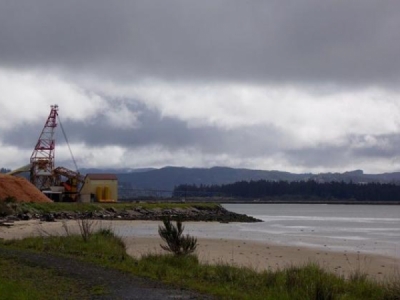
Posted on July 22, 2020
The Jordan Cove Energy Project hit another roadblock Friday after a state agency reversed local approval for part of the project’s construction.
The city of North Bend had approved a local land use permit last year for Jordan Cove to operate a dredging project in the Coos Bay Estuary, which would make room for natural gas tankers to dock at its proposed liquefied natural gas (LNG) facility. To deepen portions of the Coos Bay Deep Draft Navigation Channel, the company would construct a temporary pipe to transport the dredged material to two sites, along with a bridge between those sites and an offloading facility in the estuary connected to the pipe.
The pipe and other dredging infrastructure would run through several zones of an estuary. Each zone’s designation involves a specific set of management practices that development projects must abide by.
The Oregon Shores Conservation Coalition and Coos Bay organization Citizens for Renewables appealed the city council’s decision to the Oregon Land Use Board of Appeals (LUBA), raising objections to the city’s approval on the grounds that Jordan Cove’s project would not satisfy those management goals. LUBA agreed with several of these points, two of which were significant enough to reverse the decision and require Jordan Cove to reapply for the permits.
The first “assignment of error” to the council’s decision concerned city officials classifying the temporary dredge pipeline as a “minor navigational improvement” in a conservation aquatic zone, which requires low to moderate uses that maintain aquatic resources and allow for recreational benefits. LUBA agreed that the city did not demonstrate how the dredge pipeline would satisfy those goals.
Petitioners also argued that the offloading facility, which the city classified as a “boat dock” in order to approve it under CBEMP rules, was not a recreational boat dock and therefore inconsistent with conservation goals. LUBA upheld this, too.
Along with noise and height issues that could impact nearby Southwest Oregon Regional Airport, LUBA concluded that the temporary pipeline and offloading facility warranted a full reversal of the city’s permit.
“The bases for our sustaining two of the assignments of error do not appear to us to be able to be remedied without significant changes to the application, or a new application,” the board’s order read.
Source: heraldandnews





